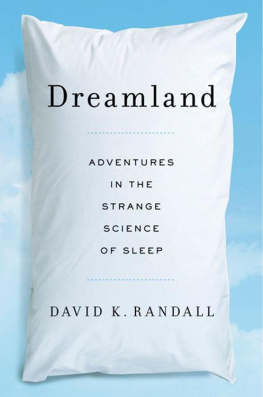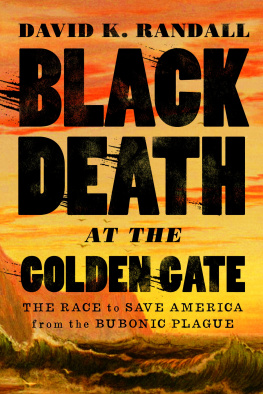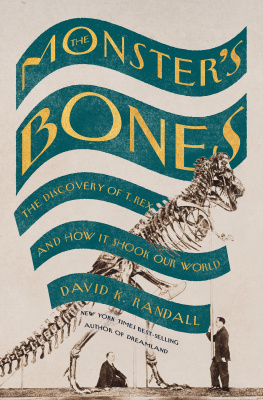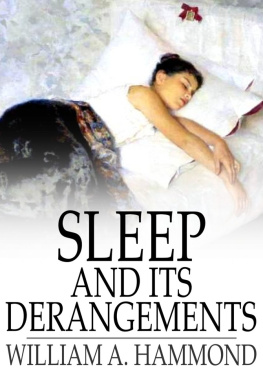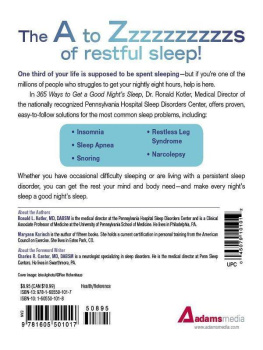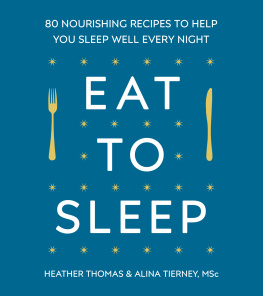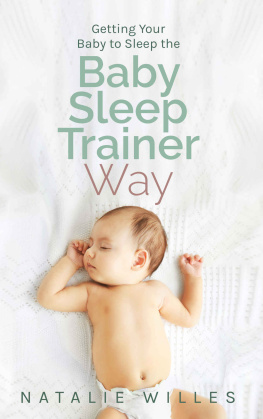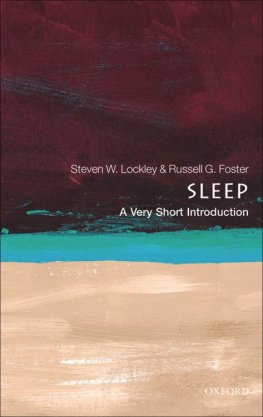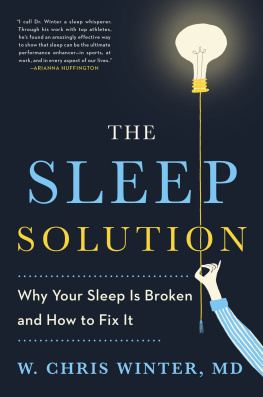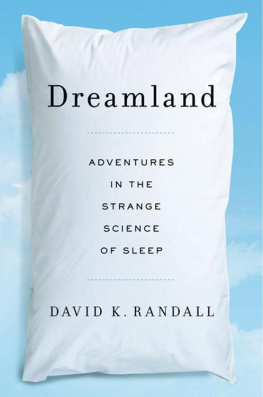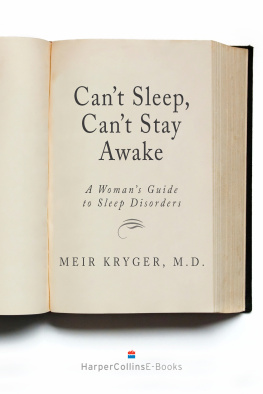
Dreamland
ADVENTURES IN THE STRANGE SCIENCE OF SLEEP

David K. Randall

W. W. NORTON & COMPANY
New York London
For Megan
That we are not much sicker and much madder than we are is due exclusively to that most blessed and blessing of all natural graces, sleep.
ALDOUS HUXLEY
Contents
I Know What You Did Last Night

O ne night, not long ago, a man found himself collapsed in a hallway, clutching his leg like a wounded bear. As his curses and howls echoed through the walls of his apartment on an otherwise silent Tuesday night, a thought passed across his brain: something had gone wrong. It was after midnight. He was not supposed to be in this position, on his back on a hardwood floor, and he was definitely not supposed to be in this much pain. He lay there, hurt and confused, not knowing what had happened, since his last memory was laying his head down on a pillow in the bedroom thirty feet away.
That man was me. It had never occurred to me, before that moment, that falling asleep could lead to injury. But there I was, in my boxers, piecing together the last few hours of my life like a disheveled detective who came late to a crime scene. Three things were immediately clear: 1) I had crashed into a wall in my apartment while sleepwalking; 2) I dont sleepwalk with my arms out in front of me like a zombie, which is a pity because 3) sleepwalking into a wall really hurts.
This was the first time that I sleepwalked, or at least the first time that I did it so badly that I ran into something. But sleep had long been a less-than-peaceful part of my life. As a child, I often fell asleep with my eyes open, a condition that unnerved my parents and spooked friends at sleepovers. When I was in college, I unknowingly entertained my roommates while I was sleeping by sitting up and yelling things like Man the barricades, the bacon is coming! Now, as a married adult, my wife is treated to a nightly show that can include talking, singing, laughing, humming, giggling, grunting, bouncing, and kicking. She handles all of this by putting in earplugs after we say good night and moving to the far side of our oversized bed, a purchase she insisted on after being on the receiving end of one well-placed kick.
The talking and kicking she could deal with. But she put her foot down once I became mobile. After a few days of limping around and hoping no one would ask why, I found myself in a sleep lab at a New York hospital. The room was decorated like a hotel room in Florida, complete with a pink watercolor painting of a palm tree hanging above what at first glance looked like a headboard. A deeper inspection revealed that it was a piece of wood bolted to the wall above a standard-issue hospital bed. The walls were painted cream, and one of the last working television-VCR combinations sat on top of a desk in the corner. Medical equipment shared space with a white beach shell on a wooden nightstand.
My brain waves were to be recorded as I slept that night so that a neurologist could see what was going on. To round the picture out, my heartbeat, breathing rate, limb movements, body temperature, and jaw pressure would be captured as well. Cue the electrodes, sixteen in all, attached to sites ranging from my temples to my ankles. A technician slathered each spot on my head with sticky white goo, manipulating my hair into what could be called the Contemporary Einstein. She taped a forked monitor inside my nostrils, glued oval sensors to each of my cheeks, and bound what appeared to be a glowing red clothespin to my index finger. A plastic blue box heavy with wires running in and out of it hung around my neck. The process of putting all of this on my body took forty-five minutes. After she finished, the technician told me that she would be in a room down the hall watching me via a video camera fixed on the ceiling and pointed at the bed. Try to sleep normally, she said as she closed the door. If she was aware of the irony, she didnt show it.
I tried to get comfortable. After a few minutes, I turned to my right side. Suddenly, a voice calling out from a pair of hidden speakers above the headboard echoed in the small room. Sir, you cannot sleep on your side. You must stay on your back, the technician said. A blinking red light on the ceiling revealed the camera that gave me away. I lay there like a board, wondering when this would be over. That night, I dreamt that I was in a prison.
A few days later, I sat in the office of the neurologist who had ordered the study, a long, slender man whose oversized glasses made his face look too small for his body. He rustled through the more than three hundred pages of data collected from my night in the sleep lab, past charts showing my brain waves spiking and falling like a boom and bust stock market. His hands settled on the summary he was looking for. He studied it quietly for a few minutes. Finally, he spoke.
Well, you certainly kick a lot.
I waited, hoping there was more to come from a test that set my health insurance company back a couple-thousand dollars.
But beyond that, Im not sure what we can do for you, he continued. Your breathing is normal, so you dont have sleep apnea. Youre not having seizures in your sleep. You awaken easily, thats clear, but thats not really a medical problem. I could give you a sleeping pill, but frankly Im not sure that its going to help.
Do I have restless leg syndrome? I asked, suddenly feeling like an actor in one of those commercials that tell you to ask your doctor whether a medication is right for you.
Do your legs feel uncomfortable if you dont kick them?
Not really, I replied.
Then its not restless leg. It may be a mild case of periodic limb movement disorder, but theres not much we can do for that.
I liked the sound of the word mild . So what should I do? I asked.
Im going to be honest with you. Theres a lot that we know about sleep, but theres a lot we dont know. If the sleepwalking continues, lets try some sedatives. But I dont want you to start taking drugs that you dont need. Try to cut down on your stress and see what happens.
I left the appointment with the vague feeling that I had been tricked. I expected science to have as thorough an understanding of sleep as it does of digestion, or any other bodily function that we cant live without. Instead I heard a doctors disconcerting admission that he didnt know what was going on or how to stop it. It was as if my body had sleepwalked itself past the frontier.
Sleep wasnt something that we were supposed to worry about in the first years of the twenty-first century. There were bigger issues requiring attention. Technology was making the world smaller by the day, the global economy blurred the lines between one day and the next, and daily life was filled with questions over what was considered normal. Many people never gave sleep much thought, and if they did, considered it nothing more than an elegant on/off switch that the body flips when it needs to take a break from its overscheduled life. Sure, we would probably like to get more of it, and yes, we may have had a weird dream or two lately, but beyond that, the importance of sleep likely hovers somewhere near that of flossing in most of our lives: something we are supposed to do more often but dont.
Next page
